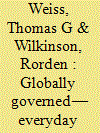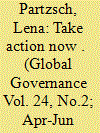|
|
|
Sort Order |
|
|
|
Items / Page
|
|
|
|
|
|
|
| Srl | Item |
| 1 |
ID:
159201


|
|
|
|
|
| Summary/Abstract |
The purpose of this article is to establish the value of looking at global governance from the point of view of those who are governed, thereby making them more visible in a field in which they have often had too little profile. This is a necessary addition to an evolving global governance scholarship that seeks to highlight greater sensitivity to issues of complexity, time, space, continuity, and change. We explore recent advances in the literature emphasizing that, although much has been done to enhance global governance as an analytical endeavor, far more intensive efforts are required to reflect the everyday experiences of the globally governed. Three examples of everyday global governance are provided to illustrate how more meaningful research could be accomplished and the potential payoffs that could result.
|
|
|
|
|
|
|
|
|
|
|
|
|
|
|
|
| 2 |
ID:
159199


|
|
|
|
|
| Summary/Abstract |
HOW “PUBLIC” IS PUBLIC INTERNATIONAL LAW? DESPITE ITS NATURAL LAW
origins, international law has long privileged the role of the state. Today,
NGOs and civil society actors play an increasingly important role—offering
a voice for the disenfranchised through their advocacy and a helping hand for
the disadvantaged through their operations. Calls for accountability from
these actors are understandable, but often founder on their diversity. This
essay develops a typology of such actors, based on their activities and their
drivers, to distinguish justifications for and potential mechanisms of accountability.
In addition, it suggests a possible evolution in the international order
where the status of an actor (state, intergovernmental organization, NGO,
etc.) is less important than its function
|
|
|
|
|
|
|
|
|
|
|
|
|
|
|
|
| 3 |
ID:
159206


|
|
|
|
|
| Summary/Abstract |
After the end of the Cold War, states and international organizations increasingly adopted a new “anti-coup norm.” However, this norm has evolved unevenly and has never been universally embraced or consistently enforced. In this article, I examine the uneven evolution of the anti-coup norm by tracing its fate within the United Nations system. I show how member states have sought to retain discretion in how they respond to individual coup cases and how, in response, UN officials within the Secretariat sought to pursue norm institutionalization by changing the UN's internal rules and procedures for dealing with coup countries. In doing so, they pursued “lowest common denominator” norm institutionalizsation, which involves seeking to achieve the highest level of institutionalization possible even if it means aiming for a lower level of progress than norm promoters would ideally like.
|
|
|
|
|
|
|
|
|
|
|
|
|
|
|
|
| 4 |
ID:
159205


|
|
|
|
|
| Summary/Abstract |
This article uses the ongoing policy debate over “harm reduction” as a lens for examining the complex relationships between global health governance and the global governance of other issue areas—in this case, the global narcotics control regime. Examining the dynamics of policy entrepreneurship at this interface, I argue that both material and ideational power matter, and that there is a need to better understand the potential influence that global health institutions have in other policy spheres and the extent to which framing can be a successful advocacy strategy. Without denying the potential for policy entrepreneurship, I argue that this case offers some insights into how power and influence operate at such interfaces, which can be important in better understanding the potential for global health institutions to successfully promote pro-health policies.
|
|
|
|
|
|
|
|
|
|
|
|
|
|
|
|
| 5 |
ID:
159204


|
|
|
|
|
| Summary/Abstract |
Public procurement around the world tends to be heavily skewed toward local firms. This “home bias” has been falling in many countries, independent of whether states have agreed to binding disciplines on government procurement in a trade agreement. Extant research suggests that reciprocally negotiated market access commitments have not been very effective in inducing governments to buy more from foreign suppliers. In this article, I present data and review available research on home bias in procurement. I argue that the evidence suggests policy should put less emphasis on specific market access reciprocity through trade agreements in favor of a greater focus on learning about good procurement practices and principles, enhancing transparency and accountability, and pursuing pro-competitive policies more generally.
|
|
|
|
|
|
|
|
|
|
|
|
|
|
|
|
| 6 |
ID:
159200


|
|
|
|
|
| Summary/Abstract |
In this article, I examine the institutional responses that arose in Latin America around the issue of drug trafficking during the 1970s, in particular the emergence of anti-narcotics policing in that period. The central focus is on the manner in which the anti-narcotics agencies of the United States—especially the Drug Enforcement Administration—contributed to the structuring of the field of anti-narcotics policing in Latin America. Staring from a reexamination of various documentary and archival collections, I analyze the origins of the anti-narcotics police institutions in Latin America, along with the diffusion of the practices of institutional development undertaken by the DEA, such as the creation of police networks in the region.
|
|
|
|
|
|
|
|
|
|
|
|
|
|
|
|
| 7 |
ID:
159203


|
|
|
|
|
| Summary/Abstract |
Celebrities are able to mobilize a wide range of people on a global scale. In his Oscar acceptance speech, Leonardo DiCaprio urged his international audience to work collectively to combat climate change. Another example of celebrity activism is Daryl Hannah's support for biofuels and the campaign against the Keystone XL pipeline. In this article, I analyze the legitimacy of such celebrity power in international relations along three criteria (political impact, broad participation, and control and accountability). I argue that, as long as celebrities' claims are vague and do not go further than UN consensus, celebrity power can be considered legitimate through the political impact. In addition, DiCaprio and Hannah contribute civil society perspectives to the international agenda while, however, not necessarily voicing the most marginalized positions. Finally, by urging governments to comply to international agreements, as DiCaprio does, he holds governments accountable on behalf of the public. However, both DiCaprio and Hannah claim to speak on behalf of affected people who cannot hold the celebrities themselves accountable for their political action. This lack of control is problematic if celebrities convey more radical positions that are not generally endorsed by the international community, as Hannah does when protesting against Keystone XL and promoting biofuels.
|
|
|
|
|
|
|
|
|
|
|
|
|
|
|
|
| 8 |
ID:
159202


|
|
|
|
|
| Summary/Abstract |
Utilizing the examples of three G7/8 summits held in Japan in recent years— the 2000 Kyūshū-Okinawa summit, the 2008 Hokkaidō-Tōyako summit, and the 2016 Ise-Shima summit—I analyze in this article the extent to which the norm of inclusive approach to the participation of civil society in global governance processes has been embraced by subsequent Japanese governments. I propose that the norm of civil society inclusion in global governance processes has not yet taken sufficient hold among Japanese ruling elites, and the extent and the conditions of civil society organization participation in the summits were dictated by the political philosophy of the given prime minister in power, resulting in an inconsistent and contradictory approach to nongovernmental actors.
|
|
|
|
|
|
|
|
|
|
|
|
|
|
|
|
|
|
|
|
|